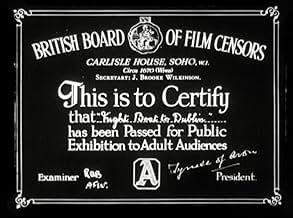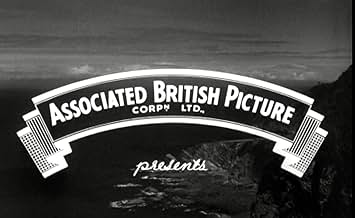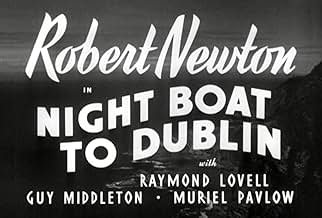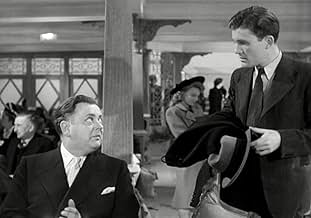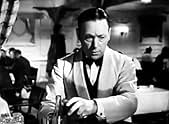IMDb-BEWERTUNG
6,2/10
475
IHRE BEWERTUNG
Füge eine Handlung in deiner Sprache hinzuThe allies plan to rescue a Swedish atomic scientist from under the noses of the Nazis.The allies plan to rescue a Swedish atomic scientist from under the noses of the Nazis.The allies plan to rescue a Swedish atomic scientist from under the noses of the Nazis.
Scott Forbes
- Lieut. Allen
- (as Julian Dallas)
J. Hubert Leslie
- Ticket Collector
- (as Hubert Leslie)
Empfohlene Bewertungen
This film, issued in 1946, may have had some last minute plot changes made to it, as I suspect it was written and planned before the War actually ended. There is still a ring of Nazi agents at work in this film, but the War is now over and the Nazis have become an international organisation trying to steal the secrets of the atomic bomb and sell them to other hostile powers or organisations. (This is not unlike the scare stories still prominent in today's newspapers on a weekly basis, though the villains who threaten to destroy us all are constantly changing, it seems.) 'The Irish Free State' is still a bogey in the film, where the Nazis feel very much at home, which shows how embittered the British were at the so-called 'neutrality' of Ireland during the War. Hence the many trips on the night boat to Ireland which occur in this story. Unlike real ferry journeys across the Irish Sea, which can be horribly rough crossings, all of these take place on a flat sea without any waves. Funny that! Robert Newton in a slouch hat is the lead player, and the look of whimsy on his face is not always appropriate for moments of high tension. Wilfred Hyde Whyte has a few seconds on screen as an eccentric taxi driver. Herbert Lom has a few scenes as one of the Nazis, as does Marius Goring. The issue of this film on DVD is a pleasure to watch, because it has been taken from a perfectly preserved negative, rather than some battered old print, and the images are as crisp as the day they were made. Many of the period aspects of this film are amusing and interesting to watch, especially those featuring trains and railyards. The manners of the time never cease to be fascinating, and even the Nazis are polite as they stick a gun in your side and say they deeply regret that they will have to kill you. Brenda Bruce has a scene as a shrieking harridan who wants to go out and have a good time and nobody is going to stop her, especially not her older husband, Leslie Dwyer, a steward who has been paid for doing some favours for the Nazis on board the Irish ferry because she taunted him for never having any money. Lawrence Huntington directed this film, and it is good for a rainy afternoon.
This is a typical Edgar Wallace style 50 minute B movie, minus the decent storyline, believable characters and any tension or excitement, and extended to 90 dreary minutes.
Even the great Newton couldn't supply any gravity to this lightweight nonsense.
Even the great Newton couldn't supply any gravity to this lightweight nonsense.
Robert Newton plays an MI5 man who infiltrates a gang of Nazi agents involved in the capture of a Swedish scientist whose work on developing the Atom bomb is being smuggled out via neutral Ireland. The eponymous night boat plays an important part in the early part of the story though most of the film takes place in England.
Not a film of any great depth, its intricate plot and considerable amount of dialogue is directed with speed and skill by Lawrence Huntington, adroitly steering around several implausibilities in the plot. There are likable performances from Robert Newton, and the admirable Raymond Lovell, who seemed to appear in every other 1940s British film, gives a typically urbane performance as the chief villain; John Ruddock is creepily sinister as his secretary. Newton is assisted by the jaunty Guy Middleton, and the pair get away with several double entendres.
With superb black and white photography by Otto Heller, it's a ripping yarn from a bygone age of trilby hats, clipped accents, and British pluck.
Not a film of any great depth, its intricate plot and considerable amount of dialogue is directed with speed and skill by Lawrence Huntington, adroitly steering around several implausibilities in the plot. There are likable performances from Robert Newton, and the admirable Raymond Lovell, who seemed to appear in every other 1940s British film, gives a typically urbane performance as the chief villain; John Ruddock is creepily sinister as his secretary. Newton is assisted by the jaunty Guy Middleton, and the pair get away with several double entendres.
With superb black and white photography by Otto Heller, it's a ripping yarn from a bygone age of trilby hats, clipped accents, and British pluck.
This film caught my attention solely on the basis of the title. An rather implausible wartime yarn of how British Military Intelligence attempt to track down a kidnapped Swedish scientist who may be on the verge of a major breakthrough in nuclear technology. The story moves along at pace on the basis of hunch and coincidence, but that said moves along in an enjoyable way. Robert Newton is fine as the lead, but the real star for me at least is Guy Middleton who provides amusing quips throughout. Edited by Flora Newton one of a number of women editors working in the British Film Industry at this time.
NIGHT BOAT TO DUBLIN is a fun spy thriller that must have been shot in the dying days of World War 2. Espionage and its deadly results are the name of the game here, as the British authorities pursue a Nazi organisation running out of Ireland and in particular aim to rescue a kidnapped Swedish scientist who may have the secret to unlocking the atomic bomb. Half of the action is centred around the titular ship, with plenty of cloak and dagger shenanigans to pass the time.
And this film certainly passes the time well enough, coming across as fast paced and with just the right level of suspense to see it through. There's an early plot twist to rival PSYCHO and a delightfully urbane villain in the form of the charming Raymond Lovell, who has a real ball with the part. The sneaking around in hotel room material is good fun, too, and Robert Newton is a British hero in the finest stiff-upper-lip tradition. A triumvirate of Herbert Lom, Marius Goring, and Leslie Dwyer flesh out villainous parts, and the action-packed climax is delightful.
And this film certainly passes the time well enough, coming across as fast paced and with just the right level of suspense to see it through. There's an early plot twist to rival PSYCHO and a delightfully urbane villain in the form of the charming Raymond Lovell, who has a real ball with the part. The sneaking around in hotel room material is good fun, too, and Robert Newton is a British hero in the finest stiff-upper-lip tradition. A triumvirate of Herbert Lom, Marius Goring, and Leslie Dwyer flesh out villainous parts, and the action-packed climax is delightful.
Wusstest du schon
- WissenswertesSmall speaking part for Wilfrid Hyde White as the taxi driver that drops the happy couple at the registrar.
- PatzerIf Grant is his real name, and Hunter pretends to know him from the army, he would call him by that name and not by a fake name when he pretends to meet him 'by accident' at the solicitor's office.
- Zitate
Taxi Driver: Getting married, sir?
Capt. David Grant: Well, if you must know - yes, I am.
Taxi Driver: Oh, dear dear dear dear... .
- VerbindungenReferenced in Muriel Pavlow in Conversation with Jo Botting (2024)
- SoundtracksI Shall Remember Tonight
Lyrics & Music Phil Park
Top-Auswahl
Melde dich zum Bewerten an und greife auf die Watchlist für personalisierte Empfehlungen zu.
- How long is Night Boat to Dublin?Powered by Alexa
Details
- Erscheinungsdatum
- Herkunftsland
- Sprachen
- Auch bekannt als
- Night Boat to Dublin
- Drehorte
- Welwyn Studios, Welwyn Garden City, Hertfordshire, England, Vereinigtes Königreich(studio: produced at Welwyn Studios Welwyn Garden City)
- Produktionsfirma
- Weitere beteiligte Unternehmen bei IMDbPro anzeigen
- Laufzeit
- 1 Std. 29 Min.(89 min)
- Farbe
- Seitenverhältnis
- 1.37 : 1
Zu dieser Seite beitragen
Bearbeitung vorschlagen oder fehlenden Inhalt hinzufügen

